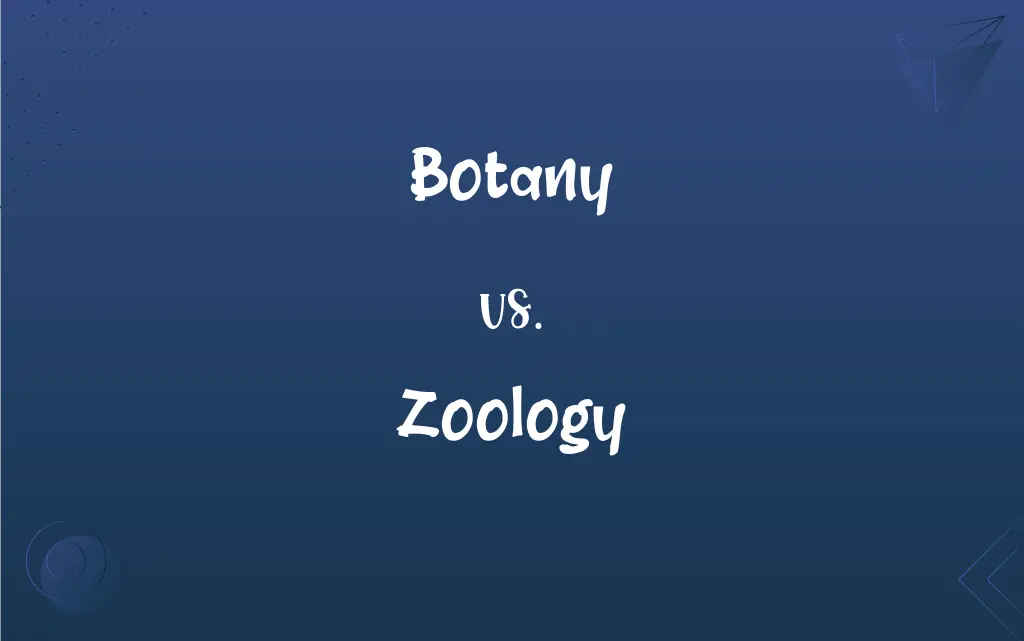Botany vs. Zoology: What's the Difference?
Edited by Janet White || By Harlon Moss || Updated on October 11, 2023
Botany is the scientific study of plants, while zoology focuses on the study of animals; both branches explore organism life, characteristics, and classification but in different kingdoms of living beings.

Key Differences
Botany and zoology are distinct branches of biology that delve into specific aspects of living organisms. Botany, concerning itself primarily with plants, spans a myriad of topics like plant physiology, genetics, and ecology. On the flip side, zoology pivots towards animals, investigating aspects like animal behavior, physiology, and evolution, providing a detailed insight into animal life.
When we examine the scope and application of both botany and zoology, we observe distinctive practices and implications in various fields. Botany, for instance, plays a pivotal role in agriculture, horticulture, and forestry, contributing to our understanding and optimization of crops and vegetation. Zoology, however, transcends into realms like veterinary science and animal conservation, enabling us to comprehend, preserve, and manage animal species effectively.
The methodologies within botany and zoology also exhibit varied facets due to the inherent differences in their subjects of study. Botany might involve studying cellular processes in plants, understanding their photosynthetic mechanisms, and exploring plant pathology. Conversely, zoology might venture into studying animal anatomy, exploring ecosystems to understand animal behaviors, and researching the molecular biology of various species.
In educational contexts, botany and zoology sometimes intersect, yet they nurture specialized skill sets in students and researchers. Botany, aiding in understanding plants’ role in ecosystems and their biochemical processes, fosters skills pertinent to plant-related industries. Zoology, offering insight into animal biology and ecology, gears individuals toward careers in wildlife, research, or conservation, which are integral to preserving biodiversity.
Industries and environmental practices significantly benefit from both botany and zoology. Botany is paramount in developing sustainable agricultural practices, creating new plant varieties, and ensuring food security. Simultaneously, zoology aids in wildlife conservation, ensuring balanced ecosystems and helping to understand the dynamics and interactions within animal populations, thereby securing ecological stability.
ADVERTISEMENT
Comparison Chart
Subject of Study
Plants
Animals
Application Fields
Agriculture, Horticulture
Wildlife Conservation, Veterinary Science
Methodological Focus
Plant Physiology, Pathology
Animal Anatomy, Behavior
Educational Implications
Plant-related industries
Animal conservation, Wildlife management
Environmental Role
Sustainable Agriculture
Biodiversity Preservation
ADVERTISEMENT
Botany and Zoology Definitions
Botany
Botany involves the scientific study and classification of plants.
My interest in botany was piqued when I first studied plant taxonomy.
Zoology
It studies the interaction of animals with their ecosystems and environments.
Zoology has revealed the complex predator-prey dynamics existing in various habitats.
Botany
It delves into the physiological processes occurring in plants.
Botany enables us to understand the intricate process of photosynthesis.
Zoology
It investigates the behaviors, physiology, and classifications of animals.
Zoology helped identify the distinct migratory patterns of various bird species.
Botany
Botany explores the genetic traits and evolutionary history of plants.
Through botany, we discern how different plant species have evolved over millennia.
Zoology
Zoology provides insights into animal genetics and reproductive strategies.
Zoology elucidates how animals employ varied reproductive strategies to ensure the survival of their offspring.
Botany
It studies the interactions of plants with other organisms and the environment.
Botany reveals how plants adapt to their environments and interact with other species.
Zoology
Zoology is the scientific study of animals and their biology.
Zoology encompasses exploring diverse animal species, from tiny insects to massive whales.
Botany
Botany can influence agricultural practices and food production.
Advances in botany have paved the way for developing resilient and high-yielding crop varieties.
Zoology
Zoology explores the evolution and ancestral lineage of animal species.
Through zoology, researchers trace the evolutionary pathways of species to comprehend their present forms.
Botany
The science or study of plants.
Zoology
The branch of biology that deals with animals and animal life, including the study of the structure, physiology, development, and classification of animals.
Botany
A book or scholarly work on this subject.
Botany
The plant life of a particular area
The botany of the Ohio River valley.
FAQs
How does botany contribute to agriculture?
Botany aids agriculture by improving crop yields, developing new plant varieties, and enhancing sustainable practices.
Can botany help address climate change?
Yes, botany can devise strategies like developing plants that sequester more carbon and ensuring resilient ecosystems.
Can zoology help understand human biology?
Yes, zoology can reveal insights about human biology by studying anatomical and physiological similarities with other animals.
How does botany assist in pharmaceutical development?
Botany helps discover, understand, and cultivate plants that are utilized for various pharmaceutical purposes.
Can zoology offer insights into animal adaptation?
Absolutely, zoology scrutinizes how animals adapt to their environments, revealing mechanisms like camouflage, mimicry, and behavioral shifts.
How is zoology relevant to wildlife conservation?
Zoology provides vital insights for wildlife conservation, understanding species’ needs, behaviors, and ecological roles.
Does zoology study extinct animal species?
Yes, zoology also examines extinct species, exploring their evolution and impact on present-day organisms.
What role does zoology play in disease research?
Zoology helps understand disease vectors, animal reservoirs, and zoonotic diseases, facilitating effective disease control strategies.
Do botany and zoology overlap in any research areas?
Yes, botany and zoology can overlap in areas like ecology, studying how plants and animals interact within ecosystems.
Does botany explore algae and seaweeds?
Yes, botany includes the study of algae and seaweeds, examining their biology, ecology, and uses.
What is the primary focus of botany?
Botany primarily focuses on the study of plants, including their physiology, classification, and ecology.
What does zoology predominantly investigate?
Zoology predominantly explores the biology, behavior, and classification of animals.
Are fungi studied in botany?
Historically yes, but fungi are now classified in their own kingdom, separate from plants, yet mycology (study of fungi) often associates with botany.
Is zoology related only to vertebrate animals?
No, zoology encompasses all animals, including invertebrates like insects and mollusks.
How do botany and zoology interrelate in an ecosystem?
Botany and zoology interrelate by exploring how plants and animals interact and coexist within ecosystems, each influencing the other's survival and evolution.
Can botany aid in combating pollution?
Yes, botany can offer solutions like phytoremediation, using plants to absorb and mitigate pollutants from the environment.
How diverse are the subjects within botany?
Botany encompasses a wide array of subjects, including plant taxonomy, phytochemistry, and paleobotany (study of ancient plants).
Can zoology influence policies related to animal conservation?
Yes, research in zoology often guides policies ensuring sustainable practices and conservation of diverse animal species.
What are the sub-fields of zoology?
Zoology has various sub-fields, such as entomology (insects), herpetology (reptiles and amphibians), and mammalogy (mammals).
How does zoology contribute to understanding animal cognition?
Zoology explores the mental capacities and cognitive abilities of animals, revealing their problem-solving, memory, and learning capabilities.
About Author
Written by
Harlon MossHarlon is a seasoned quality moderator and accomplished content writer for Difference Wiki. An alumnus of the prestigious University of California, he earned his degree in Computer Science. Leveraging his academic background, Harlon brings a meticulous and informed perspective to his work, ensuring content accuracy and excellence.
Edited by
Janet WhiteJanet White has been an esteemed writer and blogger for Difference Wiki. Holding a Master's degree in Science and Medical Journalism from the prestigious Boston University, she has consistently demonstrated her expertise and passion for her field. When she's not immersed in her work, Janet relishes her time exercising, delving into a good book, and cherishing moments with friends and family.































































